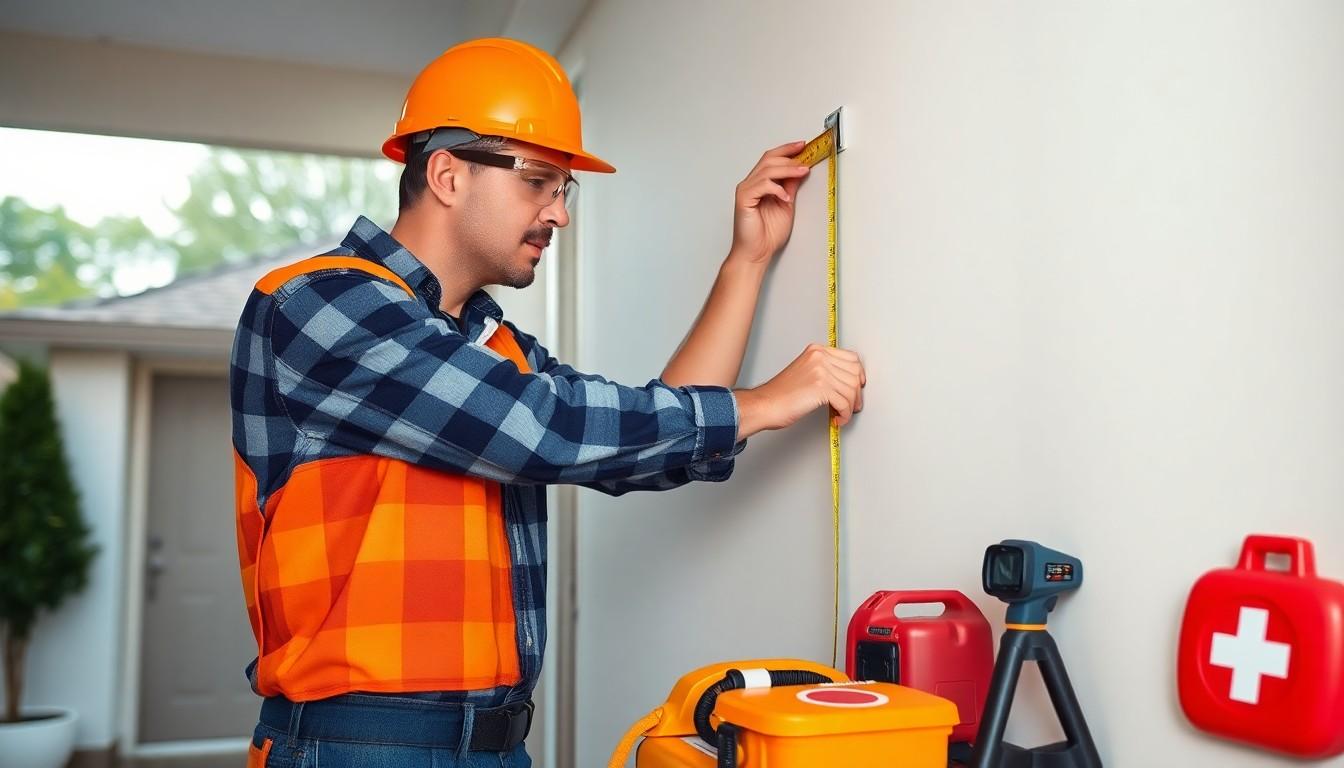When it comes to home inspections, having the right tools can make all the difference between a smooth process and a comedy of errors. Imagine a home inspector wandering around with a tape measure that only measures in inches—talk about a recipe for disaster! Equipped with the right gadgets, they can spot potential issues faster than you can say “leaky roof.”
Table of Contents
ToggleOverview of Home Inspector Tools
Home inspectors utilize a variety of tools to conduct thorough inspections. Essential items include a flashlight, which illuminates dark spaces like attics and basements, enabling inspectors to identify potential safety concerns. A quality tape measure ensures accurate measurements, promoting precision in evaluating properties.
Moisture meters stand out as crucial tools for detecting hidden moisture in walls and ceilings. Home inspectors often rely on these devices to assess water damage and prevent mold growth. Infrared cameras also play a significant role, as they reveal temperature differences that indicate insulation deficiencies or plumbing leaks.
A ladder becomes indispensable for reaching high areas, such as roofs and gutters. Inspectors frequently use it to inspect ventilation systems and chimney structures. In addition, basic hand tools like screwdrivers and pliers come in handy for tightening loose fixtures and accessing various components.
Safety equipment remains vital for every inspection. Hard hats protect inspectors from falling debris, while gloves ensure they avoid contact with hazardous materials. A first aid kit provides reassurance in case of minor injuries.
Digital tools increasingly enhance the efficiency of inspections. Tablets or smartphones allow inspectors to take notes and photos seamlessly. Software applications streamline the reporting process, making communication easier with clients.
All these tools contribute to a successful home inspection, ensuring that inspectors can accurately assess property conditions. An inspector well-equipped with the right tools can safeguard the interests of buyers and sellers alike.
Essential Tools for Home Inspection

Proper tools enhance the effectiveness and accuracy of home inspections. Below are critical categories that every inspector should prioritize.
Safety Equipment
Safety equipment protects inspectors from potential hazards. Hard hats prevent head injuries from falling objects, while gloves safeguard hands against sharp materials. Eye protection helps avoid injury from dust and debris. Listening devices allow users to hear potential issues hidden within walls. First aid kits provide peace of mind for dealing with minor injuries on-site. Using safety equipment ensures inspectors complete their work without unnecessary risks.
Measurement Devices
Measurement devices ensure accurate assessments of property dimensions. Quality tape measures are essential, allowing inspectors to take precise measurements both in inches and metric. Laser distance measurers offer quick measurements over longer distances and help save time. Levels assist in checking the alignment of surfaces, ensuring no structural deviations exist. Measuring wheels enable inspectors to cover larger areas efficiently, especially for outdoor assessments. Incorporating various measurement devices enhances overall inspection accuracy.
Inspection Cameras
Inspection cameras play a crucial role in identifying hidden issues. Thermal imaging cameras detect temperature variations, indicating insulation problems or moisture presence. These cameras help inspectors visualize problems that could otherwise remain unnoticed. Additionally, borescopes allow users to look inside walls or pipes for blockages or damage. Capturing images and videos aids in documentation, providing clear evidence for clients. Using inspection cameras significantly improves the quality and thoroughness of home inspections.
Specialty Tools for Home Inspectors
Specialty tools enhance the efficiency and accuracy of home inspections. They help inspectors uncover issues that standard tools may miss, ensuring thorough evaluations.
Thermal Imaging Cameras
Thermal imaging cameras detect temperature variations, revealing hidden problems. They identify insulation failures and plumbing leaks, contributing to better energy efficiency. These devices allow inspectors to visualize heat loss in walls, ceilings, and floors. Often, inspectors capture images that document findings for clients, reinforcing their assessments. Investing in this technology helps inspectors provide valuable insights and can lead to a more confident buying decision.
Moisture Meters
Moisture meters are crucial for identifying hidden moisture, which may lead to mold growth. These devices measure moisture content in materials, such as wood and drywall, effectively pinpointing potential issues. They provide real-time readings that inform inspectors about varying moisture levels. Inspectors can quickly recognize areas of concern, particularly in basements and crawl spaces. Using moisture meters enhances the quality of inspections and protects clients from future complications.
Gas Detectors
Gas detectors play an essential role in ensuring safety during inspections. These instruments identify harmful gases, such as carbon monoxide and natural gas leaks, often undetectable by scent alone. Inspectors benefit from using portable detectors that are easy to carry and use in various locations. Regular use of gas detectors provides peace of mind for clients, as it highlights potential dangers. Prioritizing safety through these tools helps inspectors safeguard both properties and occupants.
Choosing the Right Tools
Selecting the right tools is crucial for any home inspector. Tools must meet both practical and safety standards to ensure effective inspections.
Budget Considerations
Budget influences tool selection significantly. Inspectors often weigh cost against quality. Investing in high-quality tools leads to better efficiency and durability. Affordable options exist, but they sometimes lack essential features. A well-planned budget allows for purchasing essential tools first, such as quality tape measures and inspection cameras. Prioritizing key tools ensures adequate performance without overspending.
Tool Durability and Reliability
Durability directly affects a tool’s lifespan. Quality tools withstand wear and tear from frequent use. Inspectors must consider reliability to ensure accurate inspections. Reliable tools reduce the need for replacements and repairs, maintaining efficiency over time. Regular maintenance enhances tool longevity. Inspectors should choose brands known for durability to minimize long-term costs. Selecting rugged, dependable tools ultimately leads to fewer problems during inspections.
Having the right tools is crucial for effective home inspections. Quality equipment not only streamlines the inspection process but also enhances accuracy and safety. From essential hand tools to advanced digital gadgets, each plays a vital role in identifying potential issues.
Investing in high-quality tools ensures durability and reliability, ultimately leading to more thorough assessments. As technology continues to evolve, embracing new tools can further improve inspection efficiency. By prioritizing safety and functionality in tool selection, home inspectors can better protect themselves and serve their clients effectively.




